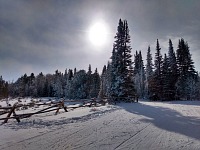 |
| Cross-country skiing is beautiful. |
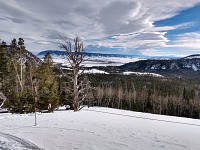 |
| Snowy Range down-hill ski slopes. |
Our journal has been turning seasonal lately, probably because our days, weeks,
months and years settle into a pre-retirement regime. Our kids have grown up and
started living their own lives — and we get to participate only in few
important events around them (and occasional paying of bills). Having moved to
the country, we experience a lot fewer trips — while in Sili Valley,
every outing to the mountains — whether to camp, hike, ride horses or ski
— was an affair spanning at least a weekend, often longer — with
planning and packing, sometimes reserving and paying hotel rooms and
attractions. Here, our closest (state) park is thirty minutes away, a National
Forest and cross-country tracks take forty five minutes — so one can
set out in the spur of a moment, for one, two hours or half a day, without much
planning and arranging. Down-hill slopes are an exception, which takes one and
half hour — typically requiring a "sacrifice" of a whole day
— but even that its a great contrast to our former trips to Kirkwood
(over three hours drive each direction).
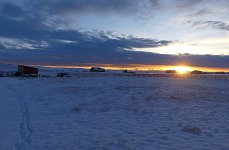 |
| It has been a hard winter. |
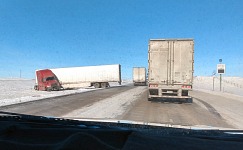 |
| Interstate 80 is a gamble — you may or may not get through. |
But if I get out to cross-country ski for two hours, it does not compel me to
note it down in the journal — unlike those substantial trips to the
Sierra. So please know that I have been getting out to ski, even several times
a week — just without those interesting affairs surrounding it.
Accumulated snow has opened new horizons for me — there's so much of it
that I can explore even snow-biking, hiking and summer trails without fear,
and combine my route so that I can shuffle through the woods in peace, avoiding
mass madness along groomed speedy thoroughfares, best suitable for skating
style. I agree that given the general population density here, mass madness
consists of running into up to three geezers a day, plus Laramie's fifth grades
on Thursdays, who have cross-country skiing as winter-time phys-ed; but even so.
When you get passed by the SAME buffed-up geriatric for the third time on the
same loop, you may start feeling like an idiot, and gladly retreat to the
aforementioned woods.
The woods are so devoid of people that I ran there into the resident moose again
on one weekend. I just suspect it's the same specimen, which had spooked me in
the fall, but I can't be sure. Without antlers he looked less majestic, but
still he hovered through the forest in utter silence. We gaped at each other for
a while on a forest road, but then snow-bikers appeared behind me, which in turn
spooked the moose. I must say that a person who accelerates on his bike toward
a half-ton animal, widely known to stand his ground against a pack of wolves or
a grizzly bear, gives the impression of a moron rather than a hero. Yet the
moose moved to a side, letting the biker pass, and thus I was not bound to deal
with giving first aid.
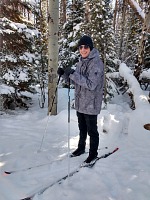 |
| Sometimes I manage to take Tom out skiing. |
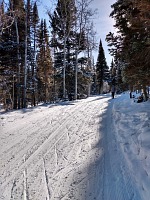 |
| Ski-skating routes are beautifully maintained. |
A second such experience was an encounter with another wild skier like me on
a forest intersection of my secret routes — earlier, I had noticed the
fact that someone else has been using "my" trails; this time we ran
into each other. We exchanged congratulations to having and knowing such great
routes here — and went each in our respective direction. Now the balance
is even — one wild moose vs. one wild skier.
This year's snow-pack has its darker consequences as well. Ski parking is
established on a windswept plateau BELOW the county road. The parking itself
falls (legislatively) under (federal) National Forest rangers — i.e. is
maintained neither by (county) road workers, nor by (private) cross-country
club: it waits for the rangers, who must be busy completing
sophisticated
tasks elsewhere, thus having no time left for cleaning parking lots (for
which they collect parking fees). This particular parking entrance goes DOWN
from the road, which any vehicle can muster — driving UP onto the highway
is the problem — especially if said entrance is blocked by some two feet
of slushy snow, in which lower clearance cars settle down to their bellies and
helplessly spin their wheels. Then there are school busses — they don't
settle so much, but sport only rear axle drives, thus tend to rear up the hill
like furious cattle, then subsequently slide back down sideways, picking up
speed toward cars previously parked there. Skiers, with combined effort,
eventually manage to bodily push a regular car up to the highway, but who would
dare such stunt with a school bus? One can only helplessly watch and hope that
one's car is parked far enough today that with luck a yellow box won't hit it
while executing a triple-axel in deep snow.
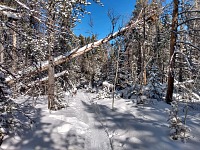 |
| I tend to disappear into the forest. |
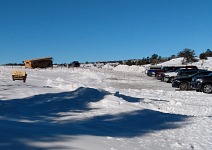 |
| This time the school bus is only stuck in a ditch and does not block the parking access. |
On one especially lucky day, when skiers had to push each other like in
a factory assembly line, two school busses got stuck in the parking lot within
two hours of each other, of which one, full of freezing kids, was blocking the
parking entrance (so we all sat in our cars and waited for a replacement bus to
arrive for the kids and a tow truck to pull the stuck bus out). While waiting,
I wrote a complaint to the rangers. Perhaps I was not the only one (I can
imagine how the parents felt, finding out that their kid sat the whole afternoon
in a bus in the mountains), but since then the parking has been relatively
maintained — at least the snow is cleared away.
Record snow-pack ironically results in us getting less often to the down-hill
slopes — for the same snow causes closures on the road over our summit.
The shortest and fastest route from Cheyenne to Laramie goes along Interstate
80, which, alas, includes Sherman Summit at 8,878 feet. Sometimes one can
bypass it at same elevation on a parallel county road named Happy Jack. If the
trouble is really with amounts of snow, the county road ends up being typically
worse. Then there are days (or weeks) when the interstate is closed not because
one could not drive on it from Cheyenne to Laramie, but because it's impassable
west from Laramie. There, our trusty gummint central planners had saved
whole nineteen miles of a freeway, and instead of following a long-established
route around the mountain, they used a ruler, drawing a line on a map across Elk
Mountain — the freeway rises to high elevations, through a landscape which
is, for understandable reasons, NOT INHABITED. Therefore there are no small
towns or hamlets that could otherwise supply snow-ploughs and sanders, and
operators for such fleet — consequently it takes very long time to make
this 100 mile stretch passable again.
Since Laramie is a smaller city, the freeway gets closed
already at Cheyenne, where's more room and plenty of civilization for truckers
— since the Eighty goes from New York through Chicago and Salt Lake City
to San Francisco, we're talking about hundreds, maybe thousands of big rigs
that accumulate here for up to a week or so.
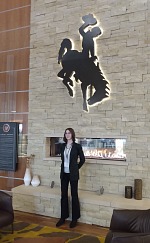 |
| Lisa attending an interview at the University. |
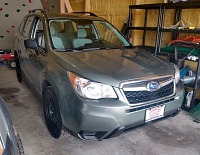 |
| Grinch. |
In the case of a systemic closure of our stretch of the freeway, we in small
cars have some options — one of them being a permit that we may obtain
to force our passage between these two cities — or we can try convincing
the cop manning the physical gate. Furthermore we can always try Happy Jack
— or the longer shortcut through Colorado. The shortcut is about twice as
long, and instead of due west, we must drive south first and then turn onto the
highway 287 running north-west to Laramie. This road does not elevate as high
as the interstate, and the landscape there is not only pretty, but also
relatively densely populated, and in case of ditching, there's a good chance
one could find help there.
Previous two winters were much milder, and we did not have many reasons (except
skiing) to go from Cheyenne to Laramie; thus we did not feel the need for
extreme measures. This year, Tom started commuting weekly to and from the
University, and we learned to monitor the state of the Eighty very carefully.
Now Lisa has applied to the same University. Scholarship interview date fell on
a day right after a snow-storm, when EVERY freeway in Wyoming was closed. The
I-80 got closed on Thursday evening, with a promise to reopen "within
12-14 hours" — and the interview was on Friday morning. Checking
the road conditions with seven a.m. coffee, it was clear — there was no
direct route for us. Lisa got tasked to text the University that we were on our
way, but didn't know when we'd arrive; we would go through Colorado.
A journey through the frosty (negative thirteen °F), snowed-in, and sunlit
landscape after a storm was very pretty — and had we not got stuck behind
a snow-plough for the final ten miles, we would have made it on time —
this way we arrived after the start of an opening speech by the dean. Nobody
minded that; instead, Lisa joined the other sixteen heroes. Of the invited
seventy candidates, only seventeen actually came. Thus we had plenty to talk
about during breaks in our program. One family drove through the closed freeway
(they had convinced the policeman who let them); most others arrived in
a complicated way — for example, a family from Cody (northern Wyoming)
drove through Montana, South Dakota, Nebraska and Colorado — they had to
drive around most of Wyoming, leaving only Utah and Idaho un-visited.
The University management did not seem to be surprised by some winter weather
— those, who did not make it, got interviewed over Zoom. Our Tom had
joined us for the later parts of our program, as his lectures for that day ended
already by eleven; his presence turned it into a nice family affair. Tom
obviously acted as a welcome specimen of a freshman student on this particular
scholarship, as we attended various presentations to shorten our while waiting
for the candidates' interviews to finish.
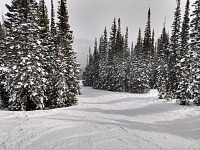 |
| Even in March, there's plenty of snow on the mountains. |
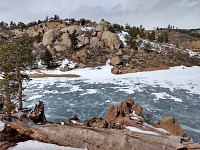 |
| In the "lowlands", at mere 7,000 feet, snow is much sparser — but it's still bitterly frosty. |
Going back home, we all drove normally along the Interstate — eastbound
was open without limitations, for no problem awaited in that direction —
neither between Laramie and Cheyenne, nor farther on in Nebraska. Since then we
had used the "shortcut" through Colorado several times — Tom on
Sunday evenings on his way to school, and Lisa with me on our way to other
dealing at the University (Lisa got the scholarship, now we arrange
accommodations), for in this weather and traffic complications it's much simpler
and safer than trying to go directly.
When Lisa's Horace died on the Eighty near the Sherman Summit, I was mostly
worried that a truck might crush into her in case of local blowing snow and ice
on the road. Of course the car decided to expire in the evening, when it was
already dark. Instead of enjoying a night without children, Sid and I had to
organize Lisa's rescue (Tom took care of that — she was headed to him and
the University, and ended up closer to Laramie than Cheyenne) and towing of the
now-dead Horace. I had to bring her back from Laramie on the next day, and then
there was the problem, what now.
Horace's engine seized, allegedly in absence of motor oil, which was Lisa's
responsibility to check, but in her defense it must be said that no warning
light ever turned on, so who knows what all failed.
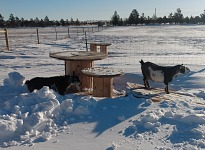 |
| Goats are somewhat sour on account of all the heaps of snow... |
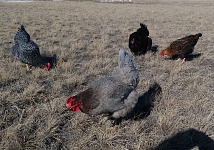 |
| ...in breaks between storms we try to take the animals out on the pasture. |
With Horace dead we faced the same problem we had in December, namely the number
of cars suitable for Wyoming winters. Both Lisa and I commute to work. Tom needs
a car to commute to the University. After superficial scanning of local ads,
we concluded there was nothing good in sight; we called our proven dealer in
Casper — where a seven years old (Subaru) Forester with mere 117 thousand
miles was being offered. Lisa agreed to pay everything she saved of two years
work at the veterinary clinic — and on Saturday, Sid with both kids
journeyed again to central Wyoming, to buy another car. I was at work, but at
least on the way back from Casper they stopped by and I could check out the
green Grinch at the restaurant's parking lot. I personally had voted that a car
as green as that be named Fiona (from Shrek), but it's not really my car and
Lisa as its new owner got to pick the name.
Not much is happening at our ranch. Goaties are very unhappy because of the
weather, and if they get to stay closed in their shed on very frosty or snowy
days, they show all signs of a cabin fever. Chickens are confused from ongoing
changes — as soon as I had trained the Cinderellas a bit to lay eggs in
the coop with the fall, winter came and the chickens now spend most days in the
goat shed.
Collecting eggs from the nicks and crannies of the goat house reminds one
of the American Easter hunt. The smallest new chicken, Rosie, remains afraid of
the other chickens and sometimes begs to be left overnight with the goats.
Ameraucans are supposed to be detached, but Rosie openly prefers being cuddled
and petted. She would snuggle in one's embrace and begin complaining about her
other comrades chickens.
Of the less merry events — by the begin of March, Lisa's second rat, Jazz,
had died. Her sister Annie left us last summer — having lived two and half
years — a respectable feat for a rat. Jazz survived her for eight more
months, past her third birthday — which is quite a record.
In her last months she turned blind and deaf, but it did not stop her from
exploring and climbing around her cage, or from snuggling up to people —
neither did it diminish her appetite. Still her time had come; we console
ourselves that she died peacefully in her sleep.
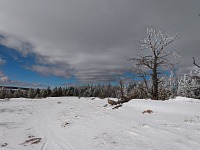 |
| Ridgeline snow hasn't melted, it got blown away by wind. |
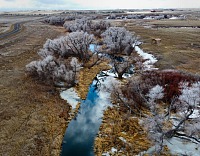 |
| Trees covered in hoarfrost look nice, but it's not my idea of spring. |
Now that we're going through the less fun stuff — Tom dragged in another
bout of common cold from school, and we all fell like dominoes; we whimpered
at home for half of February. Sometime then I reached into a drawer one morning
and discovered that I had not a single contact lens left — without lenses
I'm blind like a mole; I can't even see how I did not notice running out of my
supply. I had to hurry to visit an optometrist and beg of them a sample pack,
until I get an appointment and order another year's worth of contact lenses.
Furthermore I was plagued by some scheduled visits to a dentist. Sid, for
a change, keeps getting progressively blinder, and now awaits a surgery for
cataracts. It would seem that with the advent of retirement age (age only, for
we can't hope to be able to retire) we get the ailments of that age (e.g.
forgetfulness).
Weather does not improve our mood — the so-called Worm Moon has come and
gone — according to an alleged Indian lore, after a full moon in March,
beetles and worms are supposed to crawl out of the ground — but those
critters apparently fear their body parts could freeze off and don't rush it.
I take solace in thus extending my cross-country skiing season, but one does
not always fit skiing in one's schedule — and looking out of the window
is frequently quite depressing.
During some momentary lapse of reason, I had ordered seventy five seedlings
of bushes and trees from the Conservation District (who sell such
prairie-enhancers for a song) — seedlings normally arrive mid-April
and they must be planted (which means digging holes and carting dirt) in real
ground within a few days. I was rather worried how I would manage all that,
for the ground is still frozen stiff like a bone — but winter has caught
up with them nursery plots — I got an email that the delivery shall be
delayed due to weather. That means we're not really just spoilt Californians;
even true locals admit that this winter has been unusually hard.




















